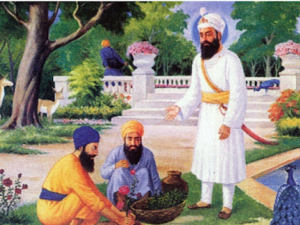Guru Nanak, the founder of the Sikh faith, was a spiritual luminary whose vision transcended religious, cultural, and social boundaries. His life and teachings offer enduring wisdom, emphasizing principles such as justice, equality, humility, and devotion to the Divine. These insights are not constrained by time or geography; rather, they continue to hold universal relevance in guiding ethical conduct and fostering compassionate societies. This article highlights seven key lessons drawn from his life and teachings, illustrating their timeless significance and practical application in contemporary life.
Introduction
Guru Nanak Dev Ji (1469–1539), the founder of Sikhism, was a visionary spiritual leader whose teachings transcend temporal, cultural, and religious boundaries. Central to his philosophy is the oneness of God (Ik Onkar), emphasizing the unity of all creation and fostering harmony beyond divisions of caste, religion, or culture. His life exemplified the principles of equality, social justice, and empowerment, particularly through the establishment of Langar and advocacy for women’s dignity. Guru Nanak promoted honest living (Kirat Karo) and selfless service (Seva) as integral expressions of spiritual practice, linking ethical action with devotion. He underscored the transformative power of meditative remembrance of God (Naam Japna), balanced living, and the pursuit of compassion and universal brotherhood. These teachings collectively offer a framework for ethical conduct, social cohesion, and inner growth. Even today, Guru Nanak’s message provides a timeless guide for creating just, compassionate, and spiritually mindful societies.
1. Oneness of God and Humanity
At the heart of Guru Nanak’s teachings lies the profound concept of Ik Onkar, that there is one eternal God, the source of all creation. This principle shatters boundaries of religion, caste, and culture, uniting all beings under a single divine truth. Guru Nanak taught that God is formless, beyond human imagination, yet immanent in every part of the universe. By recognizing this oneness, humanity is called to move beyond divisions that breed conflict and hatred. Guru Nanak’s stress on the universality of the Divine is deeply relevant in a world where religious intolerance and sectarianism often dominate public life. Guru Nanak said:
ਸਭ ਮਹਿ ਜੋਤਿ ਜੋਤਿ ਹੈ ਸੋਇ ॥ ਤਿਸ ਦੈ ਚਾਨਣਿ ਸਭ ਮਹਿ ਚਾਨਣੁ ਹੋਇ ॥
Sabh meh jot, jot hai soe. Tis dai chānan sabh meh chānan hoi.
The Divine Light is in all; the Divine Light is that One. By that Light, all are illuminated. (M. 1, SGGs, p. 13)
This verse by Guru Nanak expresses the core Sikh understanding of Ik Onkar, the One Divine Presence that pervades all creation. It highlights that there is no separation between the Creator and the created, between sacred and mundane, or between one being and another. Everything that exists is sustained and made radiant by the same Divine Light (Jot).
The belief in divine unity also establishes the moral foundation of equality, since no one is greater or lesser in the eyes of the Creator. By internalizing this vision, individuals learn humility, respect, and reverence toward all forms of life. This teaching is not only theological but also social: It encourages harmony, inclusiveness, and a sense of shared responsibility for the world. For modern times, Guru Nanak’s message of unity reminds us that true spirituality fosters coexistence, where humanity can rise above its differences and work together for peace and collective progress.
2. Equality and Social Justice
Guru Nanak lived during a time when society was divided by rigid hierarchies of caste, gender, and wealth. He strongly opposed these oppressive systems and declared the spiritual and social equality of all human beings. Guru Nanak proclaimed:
ਜਾਣਹੁ ਜੋਤਿ ਨ ਪੂਛਹੁ ਜਾਤੀ ਆਗੈ ਜਾਤਿ ਨ ਹੇ ॥
Jaanahu jot na poochhahu jaatee, aagai jaat na he.Recognize the Lord’s Light within all, and do not consider social class or status; there are no classes or castes in the world hereafter. (M.1, SGGS, p. 349)
Guru Nanak, through this verse, struck at the heart of India’s caste-based social order, which often determined one’s occupation, purity, or access to spiritual knowledge. To embody this principle, he established Langar (the community kitchen), where everyone, regardless of social background, sat together as equals to share a simple meal. This practice was revolutionary, breaking centuries-old barriers of untouchability and discrimination. Guru Nanak’s actions underscored his conviction that dignity and respect must be universal.
His teachings also empowered women, as he rejected misogynistic views that reduced them to a lower status. Instead, he reminded society that from women, kings and saints alike are born, and thus, women deserve honor and equality. He declared:
ਸੋ ਕਿਉ ਮੰਦਾ ਆਖੀਐ ਜਿਤੁ ਜੰਮਹਿ ਰਾਜਾਨ ॥
So kio mandā ākhīai jit janmeh rājān.
So why call her bad, from whom even kings are born? (M.1, SGGS, p. 473)
In today’s world, where inequality persists in forms of poverty, gender discrimination, and systemic injustice, Guru Nanak’s voice remains a beacon for human rights and social justice. His vision aligns with modern struggles for equity and inclusion, offering not just moral but also practical frameworks. Equality in his teachings was not abstract, it was lived through actions, setting a timeless example for building fairer and more compassionate societies.
3. Honest Living (Kirat Karo)
Guru Nanak emphasized the dignity of labor and the importance of earning a livelihood through honest means. He discouraged dependency, exploitation, and dishonest practices, teaching instead that true spirituality integrates with everyday life. The principle of Kirat Karo (work diligently and honestly) reminds us that earning one’s living through sincerity is itself an act of devotion. He viewed labor as sacred, a way of honoring God’s gift of life. This teaching challenged the exploitation by feudal systems and corrupt practices of his time, where wealth often came through oppression or deceit. Guru Nanak pronounced:
ਘਾਲਿ ਖਾਇ ਕਿਛੁ ਹਥਹੁ ਦੇਇ ॥ ਨਾਨਕ ਰਾਹੁ ਪਛਾਣਹਿ ਸੇਇ ॥
Ghaal khaae kichh hathahu dhei, Nanak raahu pachhaane sei.
Those who earn by the sweat of their brow and share from their earnings; O Nanak, they alone have truly understood the Way (of righteousness). (M. 1, SGGS, p. 1245)
This verse encapsulates the Sikh worldview that spirituality is not divorced from daily life, but rather expressed through it. In contemporary society, Kirat Karo holds immense relevance as it calls for ethical business, fair trade, and integrity in professional conduct. It inspires people to reject corruption, shortcuts, and greed in favor of honest effort and transparent dealings. The lesson also dignifies all types of work, whether manual or intellectual, underscoring that no occupation is lowly if pursued with sincerity. By following this path, individuals contribute positively to their families and communities, while experiencing the inner peace that comes from living truthfully. In essence, Kirat Karo elevates work into worship, where material success and spiritual fulfillment go hand in hand.
4. Selfless Service (Seva)
For Guru Nanak, devotion to God was inseparable from service to humanity. He taught that Seva (selfless service without expectation of reward) was one of the highest forms of spiritual practice. To serve others, particularly the poor and marginalized, was to serve God directly. This principle was not confined to charity alone but extended to acts of compassion, justice, and solidarity with those in need. The institution of Langar also exemplifies this teaching, as it required community members to contribute their time, effort, and resources in preparing and serving food to all, without discrimination. Guru Nanak expressed:
ਬਿਨੁ ਸੇਵਾ ਫਲੁ ਕਬਹੁ ਨ ਪਾਵਸਿ ਸੇਵਾ ਕਰਣੀ ਸਾਰੀ ॥
Bin sevā phal kabahu na pāvas se vā karaṇī sārī.
Without engaging in selfless service, no true spiritual reward or fulfillment can ever be attained; performing service (seva) with devotion and humility is the noblest and most meaningful of all deeds. (M.1, SGGS, p. 992)
Guru Nanak’s emphasis on Seva challenges the notion of spirituality as inward-looking and instead places responsibility on individuals to make the world more just and compassionate. In the modern context, Seva resonates with movements for humanitarian aid, volunteering, and community service. Whether through feeding the hungry, caring for the sick, or working for environmental justice, the essence of Seva lies in transcending self-interest. It is a call to dissolve the ego and embody empathy in action. Guru Nanak’s vision of service reminds us that love for God must translate into love and care for creation.
5. Meditation and Remembrance of God (Naam Japna)
Guru Nanak highlighted the importance of Naam Japna (the remembrance and repetition of God’s Name). However, he clarified that this was not mere ritualistic chanting but a conscious practice of internalizing divine virtues such as truth, compassion, and humility. Through constant remembrance, individuals can overcome the five vices: ego, anger, greed, attachment, and lust. For Guru Nanak, the practice of Naam was transformative, shaping character and leading to liberation from worldly illusions. Guru Nanak proclaimed:
ਨਾਨਕ ਨਾਮੁ ਮਹਾ ਰਸੁ ਮੀਠਾ ਤ੍ਰਿਸਨਾ ਨਾਮਿ ਨਿਵਾਰੀ ॥
Nānak nām mahā ras mīṭhā trisnā nām nivārī.
O Nanak, the Naam (Divine Name) is the greatest and sweetest essence; through Naam, the fire of worldly craving is extinguished. (M.1, SGGS, p. 689)
ਅੰਮ੍ਰਿਤ ਨਾਮੁ ਸਦਾ ਸੁਖੁ ਨਾਲਾ ॥
Amrit Naam Sadaa Sukh Naalaa.
The Ambrosial Naam is forever accompanied by peace. (M. 1, SGGS, p. 222)
He emphasized that spirituality is not confined to temples or rituals but must permeate everyday life, guiding actions and intentions. In today’s fast-paced and materialistic world, Naam Japna offers a powerful antidote to stress, anxiety, and moral confusion. The practice fosters mindfulness, inner peace, and resilience, helping individuals remain grounded amidst challenges. Moreover, Naam Japna cultivates gratitude and humility, countering the ego-driven pursuit of power and wealth. This lesson reminds us that true worship is not about outward displays but about nurturing a God-conscious heart. Through Naam Japna, Guru Nanak calls humanity to live in awareness of the Divine, making every moment an act of spiritual remembrance.
6. Living a Balanced Life
Guru Nanak rejected the extremes of ascetic withdrawal on one hand and indulgent materialism on the other. He believed that a truly spiritual life is one where devotion, family responsibility, and community engagement coexist harmoniously. He himself lived as a householder, showing that one need not renounce the world to achieve spiritual realization. This teaching redefined spirituality for the common person, making it accessible within the rhythms of ordinary life. Guru Nanak emphasized moderation, living simply without attachment to possessions, yet not rejecting the gifts of the material world. Guru Nanak pronounced:
ਸੇਵ ਕੀਤੀ ਸੰਤੋਖੀਈ ਜਿਨੑੀ ਸਚੋ ਸਚੁ ਧਿਆਇਆ॥ਓਨੑੀ ਮੰਦੈ ਪੈਰੁ ਨ ਰਖਿਓ ਕਰਿ ਸੁਕ੍ਰਿਤੁ ਧਰਮੁ ਕਮਾਇਆ॥ ਓਨੑੀ ਦੁਨੀਆ ਤੋੜੇ ਬੰਧਨਾ ਅੰਨੁ ਪਾਣੀ ਥੋੜਾ ਖਾਇਆ ॥
Sev kītī santokhī’ī, jinī sacho sach dhiaa-i-aa. O-nī mandai pairu na rakhi-o, kar su-krit dharam kamaa-i-aa. O-nī dunīaa toṛe bandhan-aa, ann paani thoṛaa khā-i-aa.The one who served and practiced contentment, and meditated on the True Truth. Such a person never placed their feet in the path of the wicked, but performed righteous deeds and practiced Dharma. They broke the bonds of worldly attachments and lived simply, eating little food and drinking little water. (M.1, SGGS, p. 466-467)
Thus, Guru Nanak emphasized a balanced life of devotion, ethical action, and simplicity. Acoording to him, true spirituality combines inner contentment, meditative remembrance, righteous conduct, and detachment from excessive worldly cravings. Such a person attains freedom from cycles of suffering and attachment.
His vision encourages us to fulfill worldly duties while remaining inwardly connected to the Divine. In modern life, where people often struggle between work, family, and personal growth, Guru Nanak’s balanced approach provides valuable guidance. It cautions against both obsessive consumerism and escapist detachment, urging instead a life of responsibility infused with spiritual mindfulness. By maintaining balance, individuals can find harmony between material well-being and spiritual fulfillment, contributing positively to both family and society. This teaching reminds us that true spirituality is not about retreat from life but about living it fully, meaningfully, and consciously.
7. Universal Brotherhood and Compassion
Guru Nanak’s extensive travels (Udasis) took him across India, Tibet, Arabia, and beyond, where he engaged in dialogue with people of different faiths and cultures. His interactions revealed his deep belief in universal fellowship, where humanity is bound by compassion and shared divinity. He taught that cruelty, division, and hatred arise from ignorance of God’s unity, whereas compassion (daya) and empathy are the true foundations of moral life. Guru Nanak often used poetry and hymns to emphasize that love and compassion are greater than rituals or dogmas. Guru Nanak proclaimed:
ਸਚੁ ਵਰਤੁ ਸੰਤੋਖੁ ਤੀਰਥੁ ਗਿਆਨੁ ਧਿਆਨੁ ਇਸਨਾਨੁ॥ ਦਇਆ ਦੇਵਤਾ ਖਿਮਾ ਜਪਮਾਲੀ ਤੇ ਮਾਣਸ ਪਰਧਾਨ॥
Sach vartu santoakh teerath gyaan dhiaan isnan. Dai-aa devtaa khimaa japmaalee te maan-as pardhaan.
Those who have truth as their fast, contentment as their sacred shrine of pilgrimage, spiritual wisdom and meditation as their cleansing bath, compassion as their deity, and forgiveness as their chanting beads - they are the most excellent people. (M. 1, SGGS, p. 1245)
This verse is a call to inward spirituality: live truthfully, be content, cultivate compassion and forgiveness, and fix your mind on God. Rituals alone cannot substitute for this inner moral and spiritual discipline. He emphasized:
ਦਇਆ ਕਪਾਹ ਸੰਤੋਖੁ ਸੂਤੁ ਜਤੁ ਗੰਢੀ ਸਤੁ ਵਟੁ ॥ ਏਹੁ ਜਨੇਊ ਜੀਅ ਕਾ ਹਈ ਤ ਪਾਡੇ ਘਤੁ ॥
Daiā kapāh, santokh sūt, jat gandhī sat vaṭ. Ehu janeū jīā kā haī ta pāḍe ghat.
The threads (virtues) of compassion, contentment, and righteous truth, woven together make the sacred thread of the soul. By wearing it, internally, in one’s deeds and character, the body is sanctified. (M.1, SGGS, p. 471)
In a world increasingly divided by religious and cultural conflicts, his message of universal compassion holds urgent relevance. It calls for an ethic of coexistence, where differences are embraced as expressions of divine diversity rather than sources of enmity. This lesson also extends to care for the environment and all forms of life, as compassion transcends human boundaries. By embodying empathy in action, whether in personal relationships or global policies, humanity can move closer to the harmony envisioned by Guru Nanak. His life exemplifies that a compassionate heart is the truest measure of spirituality.
Conclusion
The life and teachings of Guru Nanak offer seven timeless lessons: divine oneness, equality, honest living, selfless service, remembrance of God, balanced living, and universal compassion. These principles remain as relevant today as they were five centuries ago, offering humanity a moral compass to navigate an age of conflict, materialism, and division. Guru Nanak’s vision was not limited to a specific community but was a universal call to justice, humility, and love. His message continues to illuminate paths toward a more harmonious, ethical, and compassionate world.
Bibliography
- Sri Guru Granth Sahib. (1983). Reprint, S. G. P. C., Amritsar. India. 1-1430.
- Singh, Devinder Pal (2019). Universal Relevance of Guru Nanak’s Teachings, The Sikh Review, Kolkata. WB. India. Part -I; 67(11). 15-21. Part-II 67(12). 19-30.
- Singh, D. P. (2025). A Path to Truthful Living. Singh Brothers. Amritsar, India.
- Singh, Devinder Pal. (2023). Truthful Living: A Perspective from Sikhism. Horizon J. Hum. Soc. Sci. Res. 5 (2), 132–139. https://doi. org/10.37534/bp.jhssr.2023.v5.n2.id1212.p132
- Singh, D. P. (2018). Science, and Sikhism - Conflict or Coherence, Singh Brothers, Amritsar, India.
- Singh, D. P. (2019). A Path to Truthful Living. The Sikh Review, Kolkata. WB. India. Part -I: 67 (1), 25-32. Part -II: 67 (2), 19-30.





